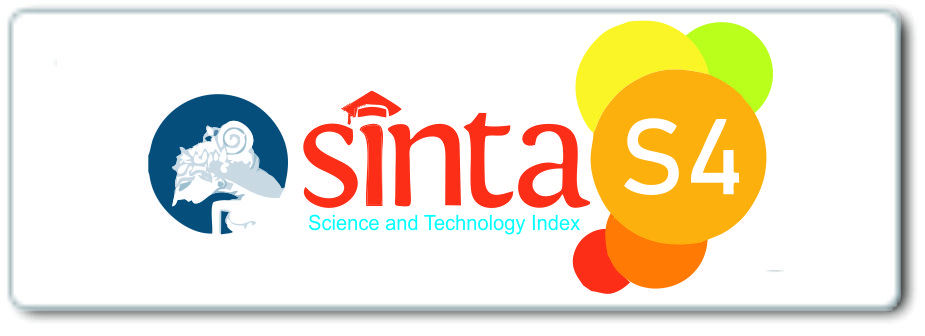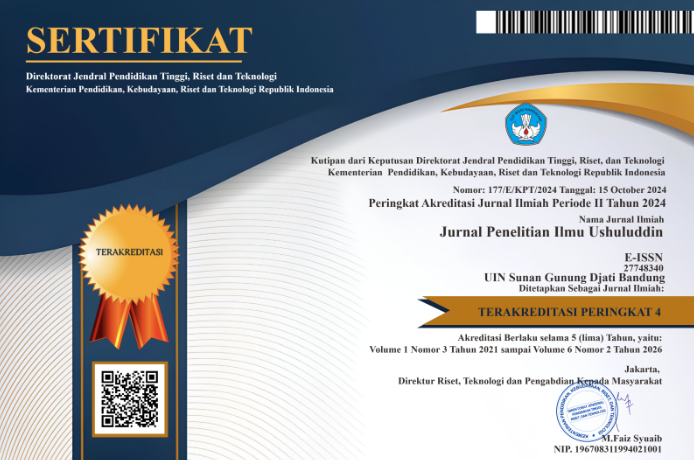Kontribusi Sikap Sabar bagi Kesehatan Mental di Masa Pandemi Covid-19: Studi Kasus pada Mahasiswa Jurusan Tasawuf dan Psikoterapi Tingkat Akhir Angkatan 2017
DOI:
https://doi.org/10.15575/jpiu.13615Keywords:
Covid-19 pandemic, Mental health, PatienceAbstract
The Covid-19 pandemic has become something that has shocked the world, one of the impacts of this condition is the occurrence of mental health disorders, one of the things that can reduce mental health disorders is to be patient. The purpose of this study was to determine the contribution of patience to mental health during the Covid-19 pandemic. This research was conducted using descriptive qualitative research methods with library and interview techniques. The results and discussion of this research show that the Covid-19 pandemic is a disaster or a test that Allah has given and it is very influential on mental health, Allah also explains in the Qur'an that if a disaster or test is struck, one should be patient. The conclusion of this study is that patience has a major contribution to mental health, this makes them feel calmer, can accept the situation with grace, and think positively about the things they face. It is hoped that future researchers will use other methods in order to obtain more comprehensive results.References
Abrori, H., & An-Najar, A. (2001). Ilmu Jiwa dalam Tasawuf : Studi Komparatif dengan Ilmu Jiwa kontemporer. Jakarta: Pustaka Azzam.
Aula, A. C. (2019, Oktober 10). Paradigma Kesehatan Mental. Surabaya: Unair News.
Azizah, N. D. (2021). Hubungan Tipe Kepribadian Hippocrates-Galenus dengan Tingkat Kesabaran Mahasiswa dalam Sistem Kuliah Online. Jurnal Perspektif, 5(1), 74-98.
Ernadewita, E., Rosdialena, R., & Deswita, Y. (2019). Sabar sebagai Terapi Kesehatan Mental. Jurnal Kajian dan Pengembangan Umat, 2(1).
Ernawati, S. (2019). Konsep Sabar Menurut M. Quraish Shihab dan Hubungannya dengan Kesehatan Mental. Semarang: Skripsi IAIN Walisongo.
Hanum, F. (2017). Psikologi Layanan terhadap Pemustaka dan Kualitas Layanan Prima. IQRA: Jurnal Ilmu Perpustakaan dan Informasi (e-Journal), 11(01), 101-113.
Husni, M. (2015). ‘Isy Allahzah. Mohandasen: Athlas lin Nashri wal Intaji wal I’lamiy.
Iryana, R. K. (2019). Teknik Pengumpulan Data Metode Kualitatif. Sorong: ofs.io.
Sari, M., & Asmendri, A. (2020). Penelitian Kepustakaan (Library Research) dalam Penelitian Pendidikan IPA. Natural Science: Jurnal Penelitian Bidang IPA Dan Pendidikan IPA, 6(1), 41-53.
Miswar, M. (2017). Maqamat (tahapan yang harus ditempuh dalam proses bertasawuf). ANSIRU PAI: Pengembangan Profesi Guru Pendidikan Agama Islam, 1(2), 8-19.
Sholiha, Z. A. (2018). Aktualisasi konsep sabar dalam perspektif al-qur’an (studi terhadap kisah nabi ayub). Jurnal At-Tibyan: Jurnal Ilmu Alqur'an dan Tafsir, 3(2), 200-211.
Najamuddin, N. (2018). Kesabaran dan Kesehatan Mental dalam Bimbingan Konseling Islam. Tasamuh: Jurnal Studi Islam, 10(1), 241-272.
Najati, M. U. (2005). Psikologi dalam Al-Qur'an, Terapi Qur'ani dalam. Bandung: CV Pustaka Setia.
Putri, A. W., Wibhawa, B., & Gutama, A. S. (2015). Kesehatan mental masyarakat Indonesia (pengetahuan, dan keterbukaan masyarakat terhadap gangguan kesehatan mental). Prosiding Penelitian dan Pengabdian kepada Masyarakat, 2(2).
Ridlo, I. A. (2020). Pandemi Covid-19 dan tantangan kebijakan kesehatan mental di Indonesia. INSAN Jurnal Psikologi Dan Kesehatan Mental, 5(2), 162-171.
Setyaningrum, W., & Yanuarita, H. A. (2020). Pengaruh covid-19 terhadap kesehatan mental masyarakat di Kota Malang. JISIP (Jurnal Ilmu Sosial dan Pendidikan), 4(4).
Stiono, H. (2015). Konsep Sabar dan Aktualisasinya dalam Pendidikan Agama Islam di Lingkungan Keluarga. Yogyakarta: Universitas Islam Negeri Sunan Kalijaga.
Suela, B. A. (2020, Mei 24). Pandemi dan Pengaruhnya Terhadap Kesehatan mental. Pusat Informasi Psikologi Universitas Padjajaran.
Sukino, S. (2018). Konsep Sabar dalam Al-Quran dan Kontekstualisasinya dalam Tujuan Hidup Manusia Melalui Pendidikan. Ruhama: Islamic Education Journal, 1(1).
Sumanto, E. (2019). Esensi, Hakikat, dan Eksistensi Manusia (Sebuah Kajian Filsafat Islam). El-Afkar: Jurnal Pemikiran Keislaman dan Tafsir Hadis, 8(2), 60-69.
Susilo, A., Rumende, C. M., Pitoyo, C. W., Santoso, W. D., Yulianti, M., Herikurniawan, H., ... & Yunihastuti, E. (2020). Coronavirus Disease 2019: Tinjauan Literatur Terkini. Jurnal Penyakit Dalam Indonesia, 7(1), 45-67.
Tasmara, T. (2006). Kecerdasan Ruhaniah. Jakarta: Gema Insani.
Tim Cable News Network Indonesia. (2020). Studi Ungkap Depresi Naik 3 Kali Lipat dari Sebelum Covid-19. Jakarta: Cable News Network Indonesia.
Wahidmurni. (2017). Pemaparan Metode Penelitian Kualitatif. Research Repository.
Wijaya, C. (2021). Covid-19: Stres, Mudah Marah, hingga Dugaan Bunuh Diri, Persoalan Mental Murid Selama Sekolah dari Rumah. Jakarta: British Broadcasting Corporation News.
World Health Organization. (2018, Maret 30). Mental Health: Strengthening Our Response. World Health Organization.
Zulhammi, Z. (2016). Tingkah laku sabar relevansinya dengan kesehatan mental. Darul Ilmi: Jurnal Ilmu Kependidikan dan Keislaman, 4(1).
Downloads
Published
Issue
Section
License
Authors who publish in Jurnal Penelitian Ilmu Ushuluddin agree to the following terms:
- Authors retain copyright and grant the journal right of first publication with the work simultaneously licensed under an Attribution-ShareAlike 4.0 International (CC BY-SA 4.0) License that allows others to share the work with an acknowledgment of the work's authorship and initial publication in this journal.
- Authors are able to enter into separate, additional contractual arrangements for the non-exclusive distribution of the journal's published version of the work (e.g., post it to an institutional repository or publish it in a book), with an acknowledgment of its initial publication in this journal.
- Authors are permitted and encouraged to post their work online (e.g., in institutional repositories or on their website) prior to and during the submission process, as it can lead to productive exchanges, as well as earlier and greater citation of published work (See The Effect of Open Access).












